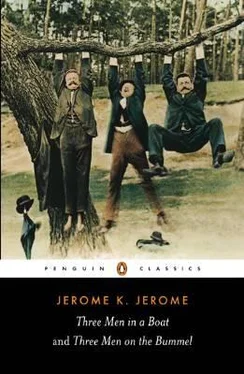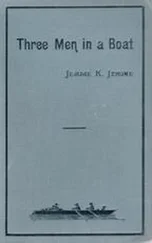Jerome Jerome - Three Men on the Bummel
Здесь есть возможность читать онлайн «Jerome Jerome - Three Men on the Bummel» весь текст электронной книги совершенно бесплатно (целиком полную версию без сокращений). В некоторых случаях можно слушать аудио, скачать через торрент в формате fb2 и присутствует краткое содержание. Жанр: Юмористическая проза, на английском языке. Описание произведения, (предисловие) а так же отзывы посетителей доступны на портале библиотеки ЛибКат.
- Название:Three Men on the Bummel
- Автор:
- Жанр:
- Год:неизвестен
- ISBN:нет данных
- Рейтинг книги:4 / 5. Голосов: 1
-
Избранное:Добавить в избранное
- Отзывы:
-
Ваша оценка:
- 80
- 1
- 2
- 3
- 4
- 5
Three Men on the Bummel: краткое содержание, описание и аннотация
Предлагаем к чтению аннотацию, описание, краткое содержание или предисловие (зависит от того, что написал сам автор книги «Three Men on the Bummel»). Если вы не нашли необходимую информацию о книге — напишите в комментариях, мы постараемся отыскать её.
Three Men on the Bummel — читать онлайн бесплатно полную книгу (весь текст) целиком
Ниже представлен текст книги, разбитый по страницам. Система сохранения места последней прочитанной страницы, позволяет с удобством читать онлайн бесплатно книгу «Three Men on the Bummel», без необходимости каждый раз заново искать на чём Вы остановились. Поставьте закладку, и сможете в любой момент перейти на страницу, на которой закончили чтение.
Интервал:
Закладка:
"Any sign of that restaurant?" said George.
"I don't notice it," replied Harris; "but it's there, you may be sure; confound it!"
Five minutes later we stood upon the top. We looked north, south, east and west; then we looked at one another.
"Grand view, isn't it?" said Harris.
"Magnificent," I agreed.
"Superb," remarked George.
"They have had the good sense for once," said Harris, "to put that restaurant out of sight."
"They do seem to have hidden it," said George. "One doesn't mind the thing so much when it is not forced under one's nose," said Harris.
"Of course, in its place," I observed, "a restaurant is right enough."
"I should like to know where they have put it," said George.
"Suppose we look for it?" said Harris, with inspiration.
It seemed a good idea. I felt curious myself. We agreed to explore in different directions, returning to the summit to report progress. In half an hour we stood together once again. There was no need for words. The face of one and all of us announced plainly that at last we had discovered a recess of German nature untarnished by the sordid suggestion of food or drink.
"I should never have believed it possible," said Harris: "would you?"
"I should say," I replied, "that this is the only square quarter of a mile in the entire Fatherland unprovided with one."
"And we three strangers have struck it," said George, "without an effort."
"True," I observed. "By pure good fortune we are now enabled to feast our finer senses undisturbed by appeal to our lower nature. Observe the light upon those distant peaks; is it not ravishing?"
"Talking of nature," said George, "which should you say was the nearest way down?"
"The road to the left," I replied, after consulting the guide book, "takes us to Sonnensteig-where, by-the-by, I observe the 'Goldener Adler' is well spoken of-in about two hours. The road to the right, though somewhat longer, commands more extensive prospects."
"One prospect," said Harris, "is very much like another prospect; don't you think so?"
"Personally," said George, "I am going by the left-hand road." And Harris and I went after him.
But we were not to get down so soon as we had anticipated. Storms come quickly in these regions, and before we had walked for quarter of an hour it became a question of seeking shelter or living for the rest of the day in soaked clothes. We decided on the former alternative, and selected a tree that, under ordinary circumstances, should have been ample protection. But a Black Forest thunderstorm is not an ordinary circumstance. We consoled ourselves at first by telling each other that at such a rate it could not last long. Next, we endeavoured to comfort ourselves with the reflection that if it did we should soon be too wet to fear getting wetter.
"As it turned out," said Harris, "I should have been almost glad if there had been a restaurant up here."
"I see no advantage in being both wet AND hungry," said George. "I shall give it another five minutes, then I am going on."
"These mountain solitudes," I remarked, "are very attractive in fine weather. On a rainy day, especially if you happen to be past the age when-"
At this point there hailed us a voice, proceeding from a stout gentleman, who stood some fifty feet away from us under a big umbrella.
"Won't you come inside?" asked the stout gentleman.
"Inside where?" I called back. I thought at first he was one of those fools that will try to be funny when there is nothing to be funny about.
"Inside the restaurant," he answered.
We left our shelter and made for him. We wished for further information about this thing.
"I did call to you from the window," said the stout gentleman, as we drew near to him, "but I suppose you did not hear me. This storm may last for another hour; you will get SO wet."
He was a kindly old gentleman; he seemed quite anxious about us.
I said: "It is very kind of you to have come out. We are not lunatics. We have not been standing under that tree for the last half-hour knowing all the time there was a restaurant, hidden by the trees, within twenty yards of us. We had no idea we were anywhere near a restaurant."
"I thought maybe you hadn't," said the old gentleman; "that is why I came."
It appeared that all the people in the inn had been watching us from the windows also, wondering why we stood there looking miserable. If it had not been for this nice old gentleman the fools would have remained watching us, I suppose, for the rest of the afternoon. The landlord excused himself by saying he thought we looked like English. It is no figure of speech. On the Continent they do sincerely believe that every Englishman is mad. They are as convinced of it as is every English peasant that Frenchmen live on frogs. Even when one makes a direct personal effort to disabuse them of the impression one is not always successful.
It was a comfortable little restaurant, where they cooked well, while the Tischwein was really most passable. We stopped there for a couple of hours, and dried ourselves and fed ourselves, and talked about the view; and just before we left an incident occurred that shows how much more stirring in this world are the influences of evil compared with those of good.
A traveller entered. He seemed a careworn man. He carried a brick in his hand, tied to a piece of rope. He entered nervously and hurriedly, closed the door carefully behind him, saw to it that it was fastened, peered out of the window long and earnestly, and then, with a sigh of relief, laid his brick upon the bench beside him and called for food and drink.
There was something mysterious about the whole affair. One wondered what he was going to do with the brick, why he had closed the door so carefully, why he had looked so anxiously from the window; but his aspect was too wretched to invite conversation, and we forbore, therefore, to ask him questions. As he ate and drank he grew more cheerful, sighed less often. Later he stretched his legs, lit an evil-smelling cigar, and puffed in calm contentment.
Then it happened. It happened too suddenly for any detailed explanation of the thing to be possible. I recollect a Fraulein entering the room from the kitchen with a pan in her hand. I saw her cross to the outer door. The next moment the whole room was in an uproar. One was reminded of those pantomime transformation scenes where, from among floating clouds, slow music, waving flowers, and reclining fairies, one is suddenly transported into the midst of shouting policemen tumbling yelling babies, swells fighting pantaloons, sausages and harlequins, buttered slides and clowns. As the Fraulein of the pan touched the door it flew open, as though all the spirits of sin had been pressed against it, waiting. Two pigs and a chicken rushed into the room; a cat that had been sleeping on a beer-barrel spluttered into fiery life. The Fraulein threw her pan into the air and lay down on the floor. The gentleman with the brick sprang to his feet, upsetting the table before him with everything upon it.
One looked to see the cause of this disaster: one discovered it at once in the person of a mongrel terrier with pointed ears and a squirrel's tail. The landlord rushed out from another door, and attempted to kick him out of the room. Instead, he kicked one of the pigs, the fatter of the two. It was a vigorous, well-planted kick, and the pig got the whole of it; none of it was wasted. One felt sorry for the poor animal; but no amount of sorrow anyone else might feel for him could compare with the sorrow he felt for himself. He stopped running about; he sat down in the middle of the room, and appealed to the solar system generally to observe this unjust thing that had come upon him. They must have heard his complaint in the valleys round about, and have wondered what upheaval of nature was taking place among the hills.
Читать дальшеИнтервал:
Закладка:
Похожие книги на «Three Men on the Bummel»
Представляем Вашему вниманию похожие книги на «Three Men on the Bummel» списком для выбора. Мы отобрали схожую по названию и смыслу литературу в надежде предоставить читателям больше вариантов отыскать новые, интересные, ещё непрочитанные произведения.
Обсуждение, отзывы о книге «Three Men on the Bummel» и просто собственные мнения читателей. Оставьте ваши комментарии, напишите, что Вы думаете о произведении, его смысле или главных героях. Укажите что конкретно понравилось, а что нет, и почему Вы так считаете.










